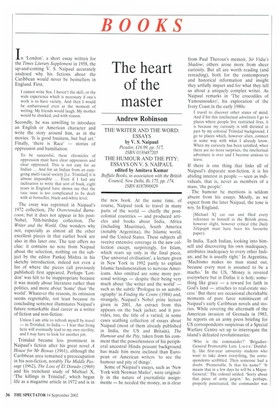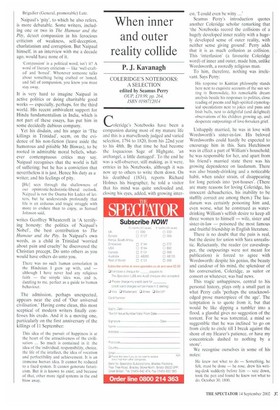The heart of the master
Andrew Robinson
THE WRITER AND THE WORD: ESSAYS by V. S. Naipaul
Picador, £16.99, pp. 517, ISBN 0330487205
THE HUMOUR AND THE PITY: ESSAYS ON V. S. NAIPAUL edited by Amitava Kumar
Buffalo Books, in association with the British Council, New Delhi, Rs 175, pp. 174, ISBN 8187890029
In 'London', a short essay written for the Times Literary Supplement in 1958, the up-and-coming V. S. Naipaul accurately analysed why his fictions about the Caribbean would never be bestsellers in England. First,
I cannot write Sex. I haven't the skill, or the wide experience which is necessary if one's work is to have variety. And then I would be embarrassed even at the moment of writing. My friends would laugh. My mother would be shocked, and with reason.
Secondly, he was unwilling to introduce an English or American character and write the story around him, as in the movies. 'It is good business, but bad art.' Finally, 'there is Race' — stories of oppression and humiliation.
To be successful, these chronicles of oppression must have clear oppressors and clear oppressed. This is not easy for an Indian ... And for an Indian from an easygoing multi-racial society [i.e. Trinidad] it is almost impossible ... Even if I had any inclination to write that sort of book, eight years in England have shown me that the race issue is too complicated to be dealt with at bestseller, black-and-white level.
The essay was reprinted in Naipaul's 1972 collection, The Overcrowded Barracoon; but it does not appear in his postNobel, 70th-birthday collection, The Writer and the World. One wonders why not, especially as almost all the other excellent pieces in that earlier book are also in this later one. The text offers no clue: it contains no note from Naipaul about the selection, nothing on the subject by the editor Pankaj Mishra in his sketchy introduction, indeed not even a list of where the pieces (all previously published) first appeared. Perhaps 'London' was felt to be inappropriate because it was mainly about literature rather than politics, and more about 'home' than 'the world'. Whatever the reasons, its omission seems regrettable, not least because its concluding sentence illuminates Naipaul's future remarkable dual career as a writer of fiction and non-fiction:
Unless I am able to refresh myself by travel — to Trinidad, to India — I fear that living here will eventually lead to my own sterility; and I may have to look for another job.
Trinidad became less prominent in Naipaul's fiction after his great novel A House for Mr Biswas (1961), although the Caribbean area remained a preoccupation in his non-fiction, notably The Middle Passage (1962), The Loss of El Dorado (1969) and his trenchant study of Michael X, 'The killings in Trinidad', which began life as a magazine article in 1972 and is in
the new book. At the same time, of course, Naipaul took to travel in many parts of the world — chiefly the postcolonial countries — and produced articles and books about India, Africa (including Mauritius), South America (notably Argentina), the Islamic world, and the United States. These subjects all receive extensive coverage in the new collection except, surprisingly, for Islam, which rears up only in the final piece, 'Our universal civilisation', a lecture given in New York in 1992 partly to explain Islamic fundamentalism to nervous Americans. Also omitted are some more personal writings — despite their being very much about 'the writer and the world' — such as the subtle 'Prologue to an autobiography' in Finding the Centre (1984) and, strangely, Naipaul's Nobel prize lecture given in 2001. An extract from this appears on the back jacket; and it provides, too, the title of a varied, in some cases scathing collection of essays about Naipaul (most of them already published in India, the US and Britain), The Humour and the Pity, taken from his comment that the powerlessness of his peripheral ancestral Hindu peasant background has made him more inclined than European or American writers `to see the humour and pity of things'.
Some of Naipaul's essays, such as 'New York with Norman Mailer', were originally in the nature of journalistic assignments — he needed the money, as is clear from Paul Theroux's memoir, Sir Vidia's Shadow; others arose more from sheer curiosity. But all are worth reading (and rereading), both for the contemporary and historical information and insight they artfully impart and for what they tell us about a uniquely complex writer. As Naipaul remarks in 'The crocodiles of Yamoussoukro', his exploration of the Ivory Coast in the early 1980s:
I travel to discover other states of mind. And if for this intellectual adventure I go to places where people live restricted lives, it is because my curiosity is still dictated in part by my colonial Trinidad background. I go to places which, however alien, connect in some way with what I already know. When my curiosity has been satisfied, when there are no more surprises, the intellectual adventure is over and I become anxious to leave.
If there is one thing that links all of Naipaul's disparate non-fiction, it is his abiding interest in people — seen as individuals, that is, never as members of a mass, 'the people'.
The humour he mentions is seldom absent from his essays. Mostly, as we expect from the later Naipaul, the tone is wry. In England,
[Michael X] cut out and filed every reference to himself in the British press, however slight, however critical (the Daily Telegraph must have been his favourite paper).
In India, 'Each Indian, looking into himself and discovering his own inadequacy, attributes inadequacy to every other Indian; and he is usually right.' In Argentina, 'Machismo makes no man stand out, because every man is assumed to be a macho.' In the US, 'Money is revered everywhere but in Dallas it is holy; something like grace — a reward for faith in God's land — attaches to real-estate success.' But there are occasional cherishable moments of pure farce reminiscent of Naipaul's early Caribbean novels and stories. While covering the aftermath of the American invasion of Grenada in 1983, he reports on an army press briefing for US correspondents suspicious of a Special Warfare Centre set up to interrogate the island's defeated revolutionaries:
'Who is the commander?' BrigadierGeneral Promotable Lutz. L-u-t-z.' Dutifully, like first-year university students who want to take down everything, the correspondents scribbled. Then someone had a doubt. 'Promotable. Is that his name?' It means that in a few days he will be a MajorGeneral.' The colonel smiled. 'Sorry about that piece of army jargon.' So, perhaps, properly punctuated, the commander was Brigadier (General, promotable) Lutz.
Naipaul's 'pity', to which he also refers, is more debatable. Some writers, including one or two in The Humour and the Pity, detect compassion in his ferocious criticism of weakness, self-deception, charlatanism and corruption. But Naipaul himself, in an interview with me a decade ago, would have none of it.
'Compassion is a political word, isn't it? A word of literary criticism — like 'well-crafted' and 'honed'. Whenever someone talks about something being crafted or honed, and full of compassion, you know you must stay away.
It is very hard to imagine Naipaul in active politics or doing charitable good works — especially, perhaps, for the third world. His recent ambivalent support for Hindu fundamentalism in India, which is not part of these essays, has put him in some decidedly dubious company.
Yet his disdain, and his anger in 'The killings in Trinidad', seem, on the evidence of his non-fiction (leave aside the humorous and pitiable Mr Biswas), to be rooted in admirable moral beliefs, whatever contemptuous critics may say. Naipaul recognises that the world is full of suffering; but he has a conviction that nevertheless it is just. Hence his duty as a writer; and his feelings of pity.
[He] sees through the shallowness of our optimistic-hedonistic-Liberal outlook. Naipaul is not the Osama bin Laden of letters, but he understands profoundly that Life is an arduous and tragic struggle with more to endure than to enjoy, as Samuel Johnson said, writes Geoffrey Wheatcroft in 'A terrifying honesty: the politics of Naipaul's Nobel', the best contribution to The Humour and the Pity. In Naipaul's own words, as a child in Trinidad 'worried about pain and cruelty' he discovered the Christian precept, Do unto others as you would have others do unto you.
There was no such human consolation in the Hinduism I grew up with, and — although I have never had any religious faith — the simple idea was, and is, dazzling to me. perfect as a guide to human behaviour.
The admission, perhaps unexpected, appears near the end of 'Our universal civilisation.' Having come clean, this most sceptical of modern writers finally confesses his credo. And it is a moving one, particularly on the first anniversary of the killings of 11 September:
This idea of the pursuit of happiness is at the heart of the attractiveness of the civilisation ... So much is contained in it: the idea of the individual, responsibility, choice, the life of the intellect, the idea of vocation and perfectibility and achievement. It is an immense human idea. It cannot be reduced to a fixed system. It cannot generate fanaticism. But it is known to exist; and because of that, other more rigid systems in the end blow away.











































































 Previous page
Previous page